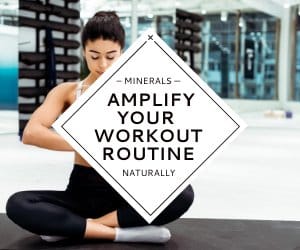It is widely known in the health and fitness community that a healthy diet is just as important as a consistent workout routine. Maybe you have heard the phrases ‘Abs are made in the kitchen’, or ‘Losing weight is 80% diet, and 20% exercise’? While these statements might be a little bit misleading they do bring home the point that you must pair a good workout routine with a healthy diet to see the best results.
A healthy diet will have a healthy amount of fruits and vegetables, lean protein, whole grains, dairy and unsaturated fats. Sticking to a healthy diet is important to make sure you are getting all the vitamins and minerals you need to keep your body in good shape. Some minerals however, are not as easy to obtain even with a healthy diet.
Right now, the Federal physical activity guidelines suggest that an adult gets at least 150 minutes of moderate exercise or 75 minutes of vigorous exercise each week. In addition, we should be doing muscle strengthening exercises two times per week. The right amount of vitamins and minerals are essential to prepare, endure and recover from your workout routine.

5 Minerals to Compliment
Your Workout Routine
Iron – Takes in Oxygen
For those who often engage in long, intense workouts, iron is an important mineral. Further, if you do not consume meat, it can be possible that you develop an iron deficiency. Iron helps your body take in oxygen, without enough iron in your system you may find yourself feeling tired or lethargic.
Calcium – Muscle
Contractions
Today, roughly 62% of people are coming up short for the required amount of calcium in their bodies. When you fall short on calcium, your body will start to utilize calcium from your bones. Calcium being pulled from your bones will leave you at risk of breaks and fractures during your weekly workout routine.
Magnesium – Strength and
Endurance
During your workout routine, you are sweating out Magnesium. The more you sweat the bigger the possibility you are losing too much magnesium during your workout routine. Other sources of depletion of magnesium can be alcohol and caffeine. Magnesium serves your body by assisting it in utilizing oxygen and glucose. Great sources of Magnesium are dark leafy greens, nuts and seeds and brown rice. Supplementation may also be a good alternative if you do not think your diet is making up for the loss.
Zinc – Muscle Recovery
Zinc is vital in the recovery process. It aids in the metabolization of carbs, fats and proteins – all of which you are consuming throughout the day to fuel our workout routine. It also helps to repair tissue afterwards, aiding in the recovery process. After an intense workout eating beef, shellfish, cheddar cheese, chickpeas or quinoa is a great way to get the Zinc your body needs.

Potassium – Energy for
your Muscles
Potassium is vital to your body’s cells by helping them use glucose to provide energy. Without potassium your muscles may lack the energy needed to complete an effective workout, you might have slower reflexes, or you might even be a little shaky. Potassium is also an important part of your workout routine because it will help with muscle contractions, aid in bone health and keeps a healthy blood pressure level. Potassium deficiencies are commonly found in women.

